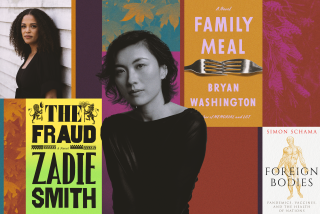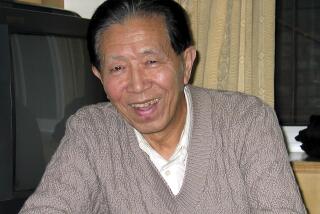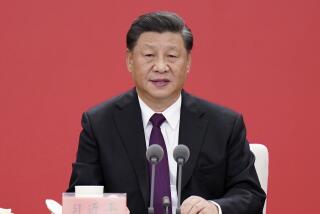Leaderâs Biography a Hit in China
BEIJING â American businessman Robert Lawrence Kuhn said he wrote a biography of former Chinese President Jiang Zemin to shed light on this Asian nation. Instead, âThe Man Who Changed China: The Life and Legacy of Jiang Zeminâ has mostly been mocked by U.S. critics, who call it an artful piece of propaganda.
Here in China, however, the book is a hit.
Biographies of living leaders are basically taboo. Any peek behind the countryâs great wall of political secrecy has bestseller potential. One penned by a foreigner tends to have special cachet.
The Chinese edition of Kuhnâs book, published by a division of Shanghai Century Publishing Group, reportedly has sold about 600,000 copies since hitting the stores last month. At just about every stop on his multi-city book tour in China, Kuhn has been feted by provincial leaders who come out of the woodwork to shake his hand and sing his praises. State media in some areas have given him front-page treatment and printed long excerpts.
Kuhn has even been trumpeted as the new Edgar Snow, a reference to the American journalist who interviewed Chairman Mao during the latterâs guerrilla days and wrote the classic book âRed Star Over China.â
Kuhn said he was surprised by the Chinese reception of the book, which was released in the West by Crown Publishers.
However, his critics note that it is difficult to get published in China unless the writer is willing to submit to heavy political censorship. (Censors cut 10% of the material from Kuhnâs book for the Chinese edition.)
âThis is more an exercise in public relations than any real journalism or history,â said Orville Schell, dean of UC Berkeleyâs Graduate School of Journalism, who has written many books on China. âThe fact that it got published at all and is doing well tells you what kind of a book it is.â
Kuhn denies that the Chinese governmentâs views had any role in the book, and says that officials who helped him did so in a personal capacity.
âThe idea was wholly mine,â Kuhn said in a telephone interview recently from his home in New York during a break in his China tour. âNo government agency, I can say categorically, authorized it. No one ever told me what to or what not to write.â
Guo Weimin, director general of the State Council Information Office, concurred that the book was Kuhnâs personal project.
âWe only helped him make some contacts,â Guo said. âThere are many books about Chinese leaders published in Hong Kong, for example, that are very exaggerated and far from the truth. We think this one is more reasonable.â
Critics say the bookâs title alone is indicative enough of its slant.
âThe Man Who Changed Chinaâ was part of the title used by Nobel Prize winner Pearl S. Buck for her 1953 biography of Sun Yat-sen, who overthrew centuries of imperial rule to establish Chinaâs first republic.
The accolade also might be appropriate for Mao Tse-tung or Deng Xiaoping. One was the founding father of communist China. The other steered the country on a course of capitalist-style reforms.
âItâs hard to argue Jiang was such a person,â said Victor Shih, a China expert at Northwestern University. âI donât think anyone would think itâs an objective opinion.â
Kuhn said he chose the title knowing it would raise some eyebrows.
âJiang was not just a passive recipient of a growing economy,â Kuhn said. âI think I made an important contribution by presenting an alternative view.â
Jiang, who ruled China for 14 years, stepped down this month from his last official post.
Kuhn said he did not try to interview Jiang because he knew he would be turned down. He talked to many of the former presidentâs close associates, including his sister, colleagues and political mentors.
âThey can call it whatever they want, but in order to get access to the people he interviewed, you would need high-level official help,â Shih said. âItâs like a bargain with the devil. To gain access, the book has to have a positive spin.â
Though the former leader may not have had a role in the book deal, his proteges looking to secure their own political futures have a stake in shaping his image and legacy. Having the biography published first in the United States gave it an added aura of legitimacy.
It doesnât hurt that Kuhn is an independently wealthy investment banker who was able to pay his expenses while researching and writing the book. Nor does he deny that he has future business interests in China.
But chronicling the life of Jiang was no easy task for a man who doesnât speak Chinese and is not a China scholar. Though Kuhn has written a number of business-related books, this was his first biography.
Ye Yonglie, a well-known Chinese author, said he was recruited by the government four years ago to work with Kuhn on the book.
âWe called it âProject 001,â â said Ye, referring to the code name given to the book. âIt was clear we were engaged in secretive work.â
Ye said his major contact was a senior official in the State Council Information Office, which is in charge of overseas propaganda. They sent him a first-class plane ticket from Shanghai to Beijing, where he was introduced to Kuhn and the book idea.
Ye thought he was tapped to help write the definitive book on Jiang. He provided Kuhn with a list of about 100 people to be interviewed, an outline of the book and 15 pages listing events in Jiangâs life.
Ye said he was expected to do all the key interviews, as well as research and write the first draft. But instead of a joint byline, Ye was told he would be credited only as key researcher and interviewer.
As author of about 300 books, many of them political biographies, Ye saw the deal as an insult. He dropped the matter after he was told the project had been canceled.
To his surprise, the book was published without mention of his contribution.
âItâs obvious I was deliberately left out,â Ye said. âThey wanted a foreignerâs name. No matter how much of an unknown he is back home, he is a foreigner, and they think that makes the book more credible.â
Kuhn said he had offered to hire Ye as a researcher but never as a coauthor.
âThat was completely unacceptable,â Kuhn said. âIt was going to be my project, my voice.â
Kuhn said that very little of what Ye provided went into the final version of the book but that he still agreed to add Ye to the long list of names on the thank-you list in future printings.
Printed on thick paper and covered in revolutionary red, reminiscent of Maoâs famous little book, Jiangâs biography is among the most expensive and most prominently displayed books in Chinese bookstores.
The high cost aside, some believe it might have been even more popular had it received less official promotion.
âMaybe cadres are rushing out to buy it,â said Zhou Xiao- zheng, a sociologist at Peopleâs University in Beijing, who hasnât read Kuhnâs book and says he doesnât know many who have. âOrdinary people definitely prefer banned books. The more you publicize it, the less people want to read it.â
More to Read
Sign up for our Book Club newsletter
Get the latest news, events and more from the Los Angeles Times Book Club, and help us get L.A. reading and talking.
You may occasionally receive promotional content from the Los Angeles Times.







